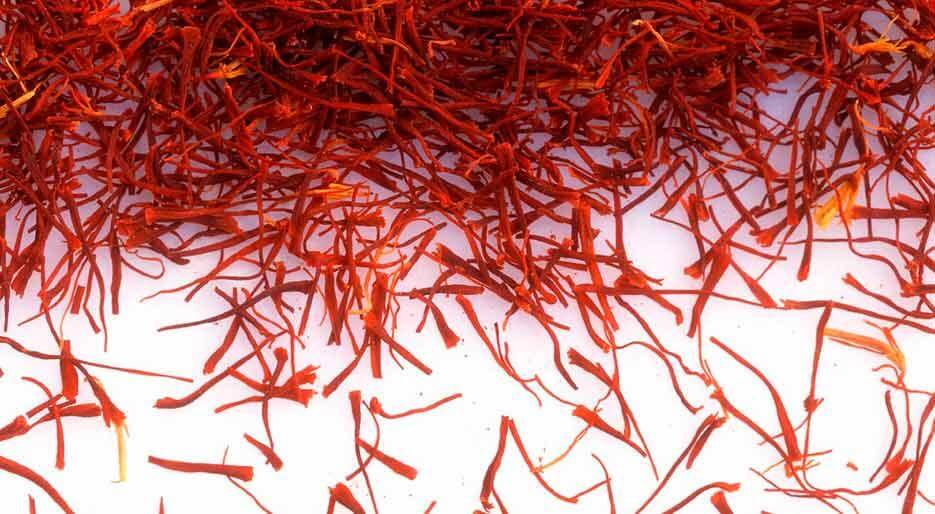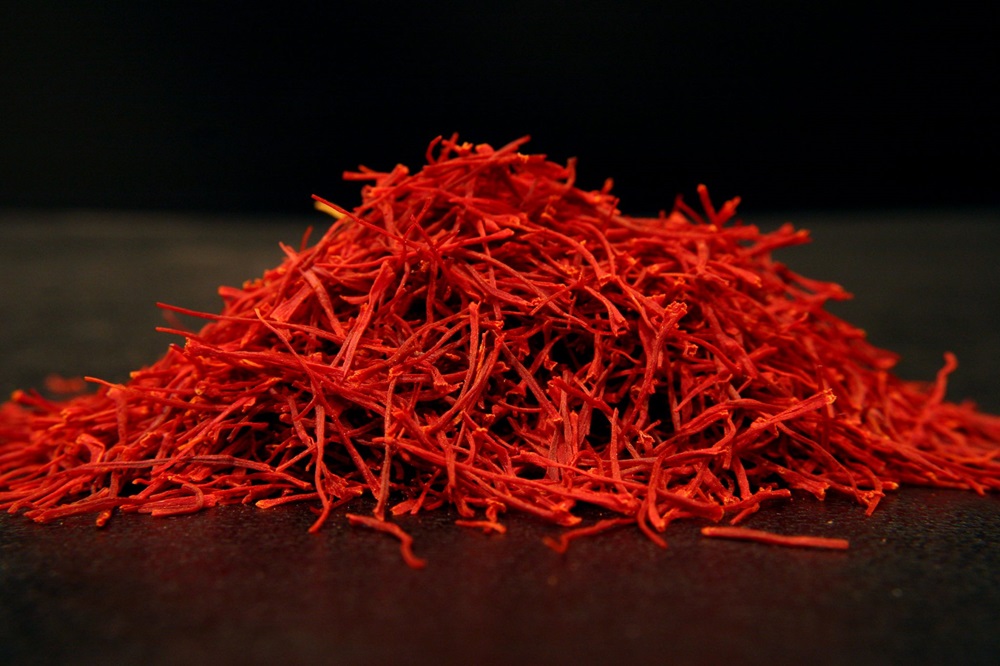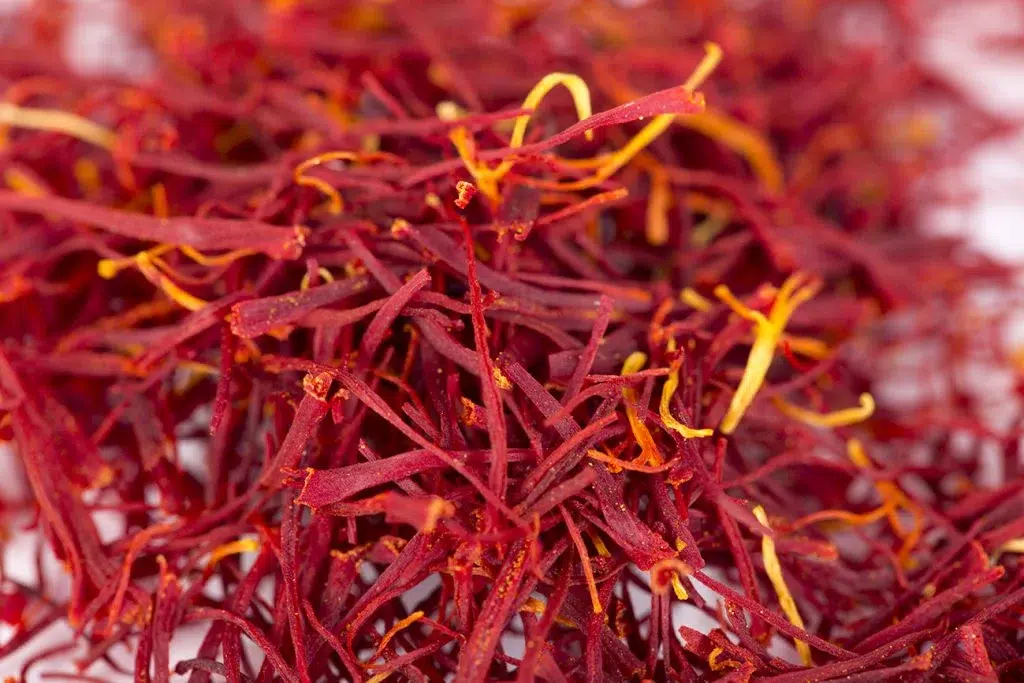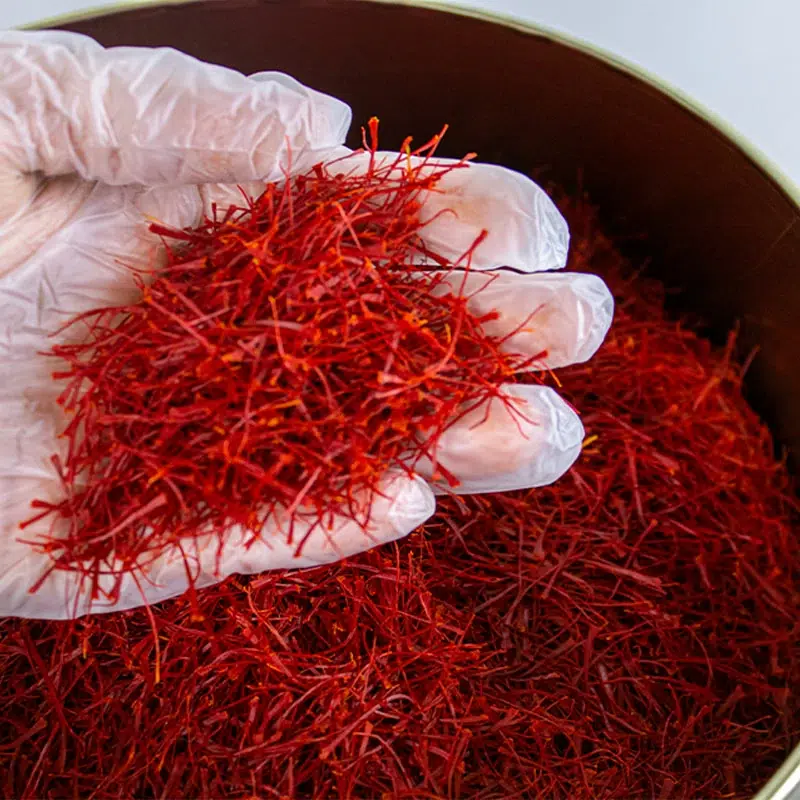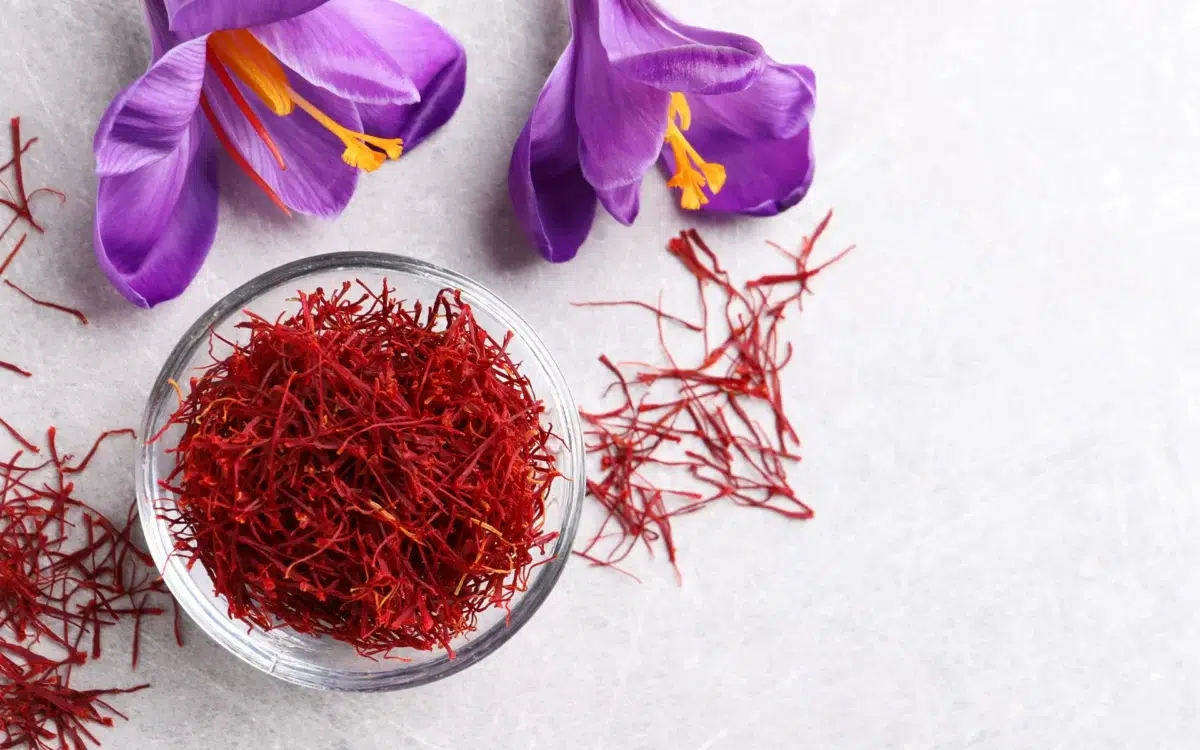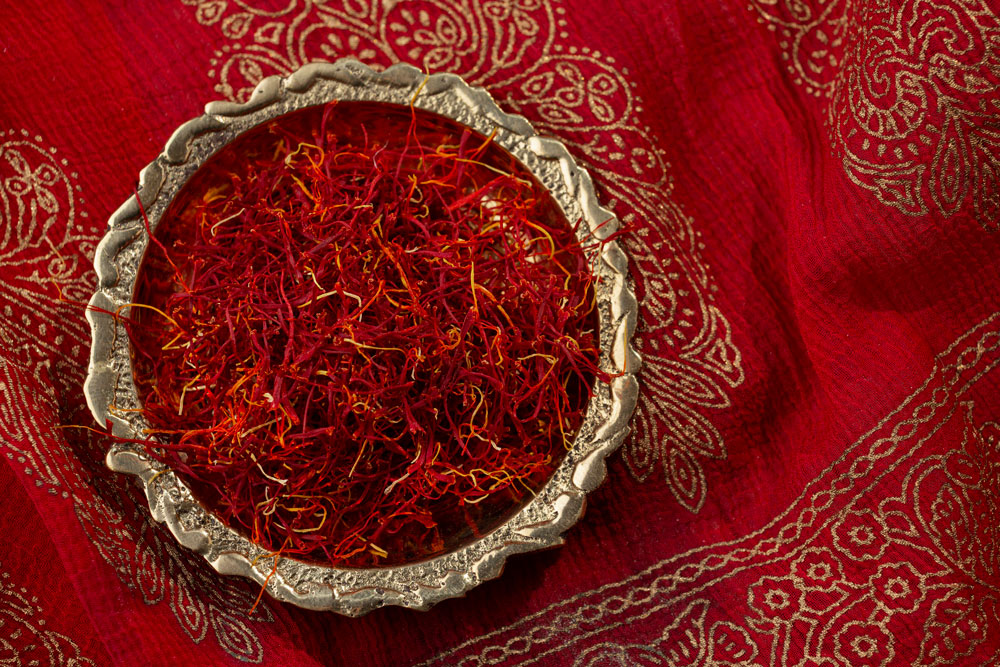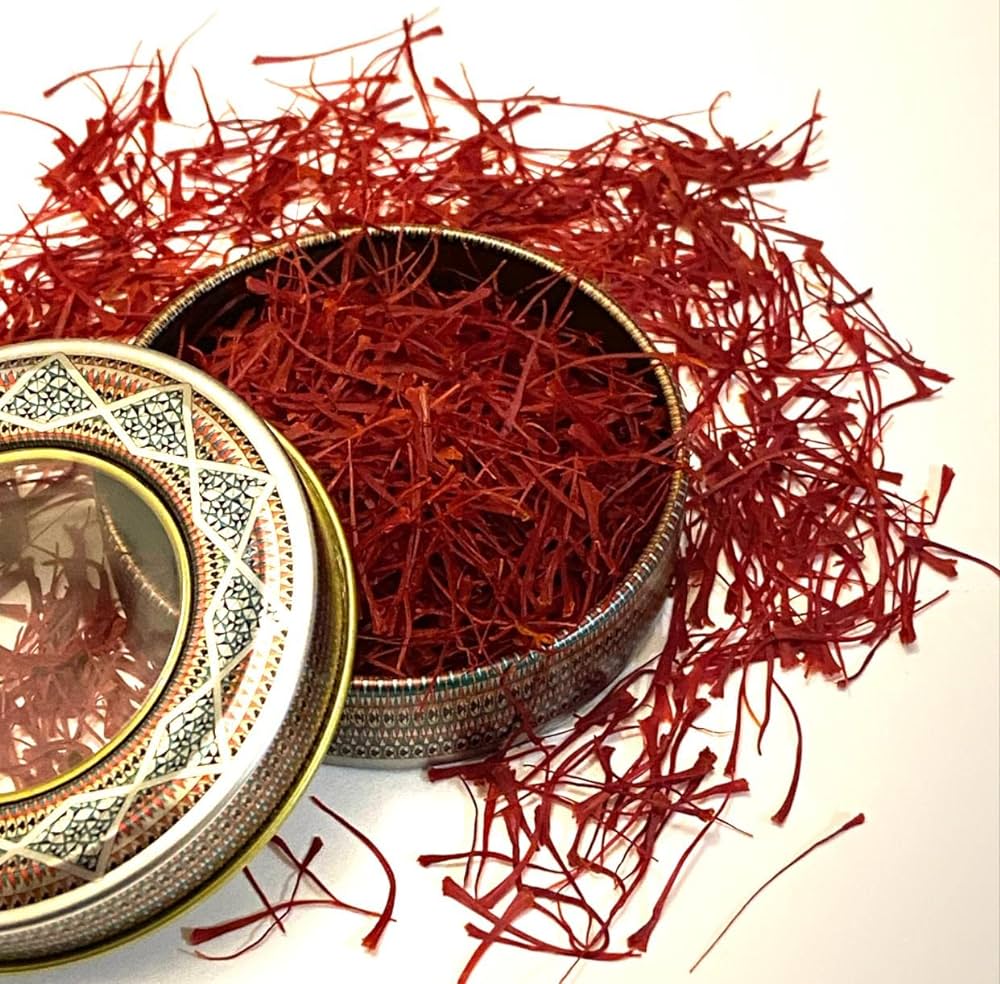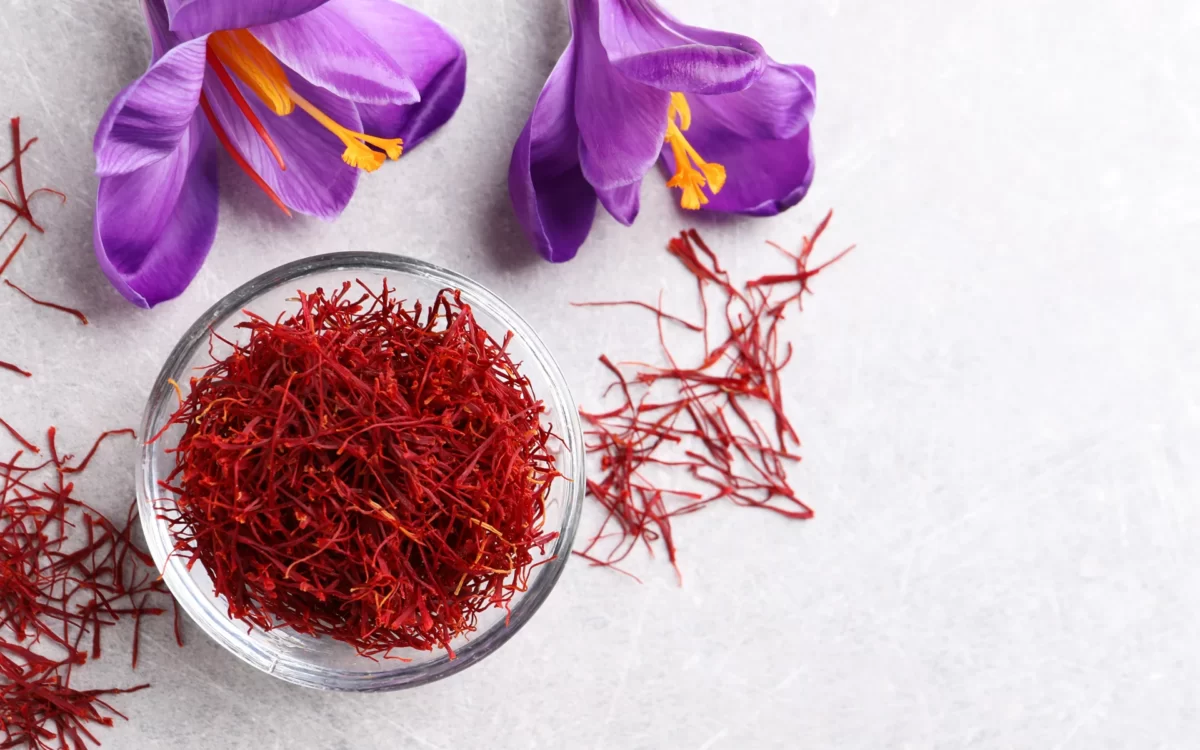Saffron, also known as Za’faran, is a spice derived from the Crocus sativus plant. Alluding to its yellow color and high cost, saffron is often referred to as the Golden Spice. Saffron has been used a seasoning in food and as a coloring agent for over 4 millennia. Today, over 90% of the worlds saffron supply stems from Iran [R].
The Crocus sativus flower consists of thread-like, crimson-colored structures known as stigmas. The stigmas are collected and dried, resulting in the saffron spice [R].
Saffron is composed of a variety of chemical compounds that give rise to its taste, color and health benefits. Historically, saffron was used in traditional medicine to treat a variety of ailments including:
- Asthma
- Cramps
- Stress
- Congestion
Similarly, saffron was often included in various preparations used for painrelief [R].
In modern medicine, saffron has gained popularity for its wide range of therapeutic benefits, including (but not limited to) [R, R]:
- Anxiety relief
- Treatment of premenstrual syndrome (PMS)
- Insulin resistance
- Diabetes
- Cancer
- Neurodegenerative disorders
- Learning disabilities
Although the role that saffron plays in mediating these benefits has not been completely understood, saffron has been proven to improve certain conditions like sexual dysfunction, depression, premenstrual syndrome (PMS), and Alzheimer’s, among others [R, R].
Formulations of Saffron
To observe health improvements from saffron, doses much higher (30 to 50 mg) than that found in food are required. Today, a number of saffron formulations exist containing doses that have been proven to have a positive outcome. These include [R]:
- Itch cream
- Scar removal cream
- Tablets
- Infusion into a tea
The dose of saffron and its active components may vary amongst formulations, or even between different manufacturers of the same preparation. Therefore, the health benefits observed may differ depending on the quality of the plant, the dose in each formulation or the constituents overall [R].
Nutritional Values of Saffron
In one tablespoon of saffron, there are [R].
Carbohydrates – 1.37 grams
Fat – 0.12 grams
Proteins – 0.24 grams
Vitamins
- Vitamin C: 1.7 mg
- Vitamin B9: .002 ug
- Vitamin B6: 0.02 mg
- Vitamin B3: 0.03 mg
- Vitamin B2: 0.01 mg
Minerals
- Iron: 0.23 mg
- Manganese: 0.6 mg
- Magnesium: 6 mg
- Copper: 0.01 mg
- Phosphorous: 5 mg
- Potassium: 36 mg
- Kaempferol – 4.3 mg
Chemical Composition of Saffron
There are over 150 compounds found in saffron. Of these, the most significant to the mechanism of action, taste, and smell of saffron are crocin, picrocrocin, and safranal [R, R].
Carotenoids: A group of compounds found in plants that are responsible for producing color in leaves and petals [R].
- Crocetin and crocin give saffron its yellowish-red color.
- Other carotenoids of importance include lycopene, zeaxanthin, and beta-carotene
Volatile oils: The aromatic oils extracted from plants, often known as essential oils [R].
- Picrocrocin is responsible for the bitter taste of saffron
- Safranal produces the odor and aroma of saffron
Saffron is also an excellent source of Kaempferol, a flavonoid molecule with antioxidant antimicrobial, and anticancer properties. It may also be effective in treating [R]:
- Type 2 diabetes
- Heart disorders
- Cosmetics (to delay aging effects on the body)
Mechanism of Action
The chemical components of saffron are responsible for its health enhancing effects. However, given a large number of chemicals present and the diverse therapeutic benefits that it exhibits, it is not entirely clear how saffron exerts its therapeutic effects [R].
Saffron increases levels of proteins required for development, blood flow, and healthy brain activity including BDNF, VEGF, and phosphorylated CREB [R].
It also acts as an antioxidant, picking up free radicals that could cause damage to proteins and DNA in cells. Saffron inhibits the buildup of the amyloid-beta protein, the main cause of Alzheimer’s disease [R].
In addition, saffron inhibits the enzyme acetylcholinesterase, which results in higher levels of acetylcholine in the blood [R].
Saffron can also lower cortisol levels and increase estrogen levels, which may account for its positive effects on bone health [R].
Saffron mediates many of its therapeutic effects through the molecule crocin. Crocin is not easily absorbed through the stomach, so in the body, it is converted to crocetin [R].
Crocetin is thought to increase serotonin levels in the brain, which might explain its antidepressant and anxiety-relieving effects [R].
Safranal, one of the other main chemicals found in saffron [R, R]:
- Stimulates beta 2 receptors: Adrenergic receptors that increase blood flow and heart rate. Stimulation mimics the effects of noradrenaline and adrenaline.
- Inhibits histamine 1 receptors: Blocks the activity of histamine.
- Inhibits muscarinic receptors: Blocks the activity of acetylcholine.
- Stimulates GABAa receptors: Mimics GABA, further increasing the anxiety-relieving effects.
Saffron also has antiviral effects, by preventing viral entry into cells and duplication of the virus [R].
Health Benefits of Saffron
Saffron has a number of health benefits, most of which are mediated by its antioxidant activities in various organs of the body [R].
1) Saffron Is an Antioxidant
In a study of 20 humans (10 healthy, 10 with coronary artery disease), daily use of saffron for 6 weeks significantly protected the body from oxidative stress [R].
Saffron exhibits its antioxidant effects by reducing inflammation, scavenging free radicals, reducing protein synthesis, and increasing the amounts of antioxidant proteins in the body [R].
Saffron’s antioxidant effects may delay the effects of aging and protect the skin from sunlight damage that could potentially lead to cancer. As a result, saffron is often found as an ingredient in sunscreens and lotions [R].
Similarly, saffron supplementation protects against the toxic effects of certain chemical drugs like chemotherapy, antibiotics, and painkillers [R].
2) Saffron Can Improve Immune Function
In a group of 45 healthy people (DB-RCT), saffron extract taken for 3 months significantly increased white blood cell count (IgG and monocytes) compared to placebo [R].
Saffron also increased white blood cell count without affecting the levels of other blood cells. This means that it can selectively enhance immunity without increasing the risk of other blood-related complications [R].
Saffron supplementation can also inhibit viral replication and entry into cells, which improves the immune system’s ability to fight off viral infections [R].
3) Saffron Can Boost Energy Levels
The active chemicals in saffron belong to a group of molecules called carotenoids. These molecules improve our energy supply and power (ergogenic effects) [R].
In a study (DB-RCT) of 28 healthy men, saffron supplementation for 10 days increased muscle strength and improved reaction time. This is likely due to improved mitochondrial function in the cell (antioxidant activity) and function of the region of the brain responsible for reacting to visual and auditory stimulus (motor cortex) [R].
Saffron improves blood flow and oxygen delivery to muscles during exercise, which may also account for these effects [R].
4) Saffron Can Reduce Symptoms of PMS

One of the oldest uses of saffron is for the treatment of premenstrual syndrome, or PMS. The symptoms of PMS include mood swings, cramps, bloating, and acne [R].
In a group of 35 women, exposure to the odor of saffron for 20 minutes significantly reduced symptoms of PMS and improved irregular periods. This effect occurred through a reduction of the stress hormone, cortisol [R].
Additionally, in 50 women, saffron supplementation daily for 6 months reduced symptoms of PMS (DB-RCT) [R].
5) Saffron May Improve Heart Function

Saffron may improve heart function by increasing the pumping capacity of the heart ventricles. This may be due to the presence of kaempferol, a molecule that reduces the incidence of heart attacks and coronary heart disease [R, R, R].
In a study of 20 subjects, 10 of which had heart disease, saffron improved health in all patients but had the most profound improvement in patients with heart conditions [R].
This may be because saffron’s constituent crocin, upon conversion to crocetin, can reduce cholesterol levels and the hardening of blood vessels (atherosclerosis) [R].
In rats suffering from heart attacks, saffron protected the heart from toxicity caused by taking certain drugs. This may be mediated by its antioxidant effects on the heart tissue, which assist in removing damage caused by toxins [R, R].
6) Saffron Can Improve Sexual Function
A study of 20 male patients with erectile dysfunction found that saffron supplementation daily for 10 days increased the frequency and duration of erections (DB-RCT) [R].
Another study (DB-RCT) in 25 diabetic men with erectile dysfunction (a common symptom in diabetes) found that saffron gel significantly improved sexual function and increased the frequency of erections [R].
Certain medications can diminish sexual drive and cause pain during sex, like antidepressants. In a study (DB-RCT) of 38 women, saffron supplemented for 4 weeks improved sexual drive and reduced pain associated with sex. Saffron also increased lubrication, which helped minimize pain during sex [R].
Saffron also improved sexual activity in healthy rats. This effect was mediated by the active chemical crocin but was not seen with safranal [R].
7) Saffron Can Improve Mood Disorders

Saffron extracts can reduce depression and anxiety partly by increasing levels of dopamine and norepinephrine [R].
In a meta-analysis (5 RCTs of 30 to 42 humans each), saffron significantly improved mood [R].
In another study (DB-RCT) of 40 women with postpartum depression, saffron supplementation for 6 weeks was more effective in treating mild to moderate depression than the common antidepressant Prozac [R].
Furthermore, saffron supplementation improved symptoms such as low mood and anxiety in a study (DB-RCT) of 60 patients with anxiety after 12 weeks [R].
Saffron can also relieve anxiety in mice. One study in mice found that saffron extract reduced anxiety-like behaviors (elevated plus maze test) and increased sleeping time. This indicates that saffron may be effective in treating insomnia and other sleep-related disorders [R].
Similar improvements in depressive symptoms were seen in 61 patients (DB-RCT) with schizophrenia given saffron extract for 12 weeks. Saffron was well tolerated and is considered safe to use, but more research is needed to determine if saffron is as effective as the current therapies used in treating schizophrenia [R, R,].
8) Saffron May Reduce Blood Pressure
A study (DB-RCT) of 230 men with infertility found that saffron supplementation for 26 weeks significantly reduced blood pressure compared to placebo [R].
Similarly, in another study, saffron tablets reduced blood pressure in higher doses (400 mg) in 30 adults after 1 week [R].
Studies in rats indicate that saffron is effective in decreasing blood pressure as well as preventing random spikes in blood pressure [R, R, R].
Consumption of saffron extracts in hypertensive rats reduced blood pressure significantly, likely by improving the structure of blood vessels [R].
Saffron may be effective for individuals with hypertension, but this claim still needs to be evaluated in humans who suffer from this condition.
9) Saffron May Combat Cancer
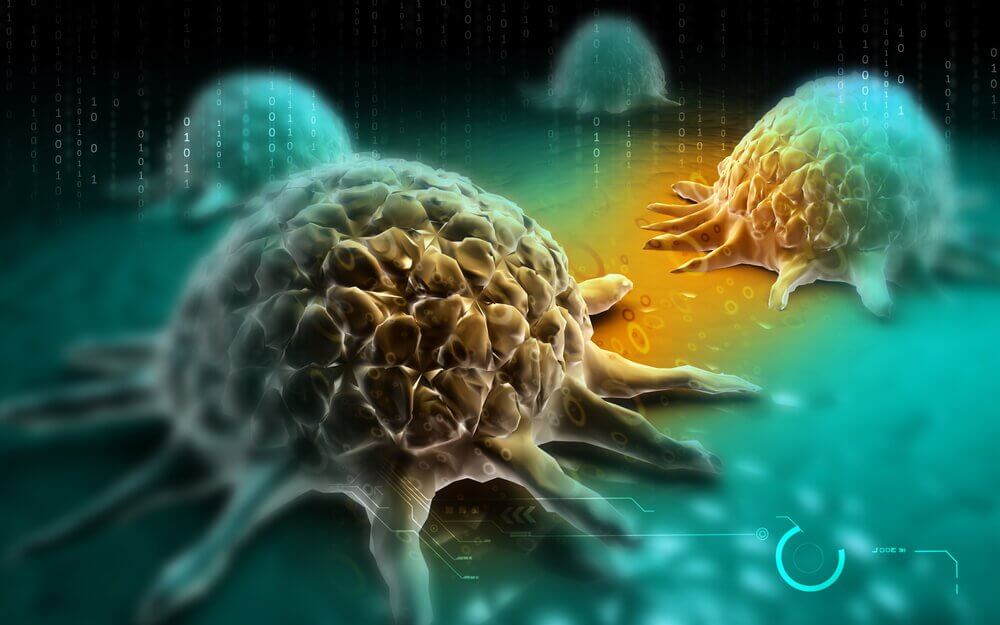
Saffron extracts have anti-cancer effects in both cell and animal models of lung, liver, breast, pancreatic, colorectal, skin, prostate, ovarian, and cervical cancer [R].
Saffron’s anti-cancer effects are mediated by the main chemical crocin, which is converted to crocetin in the body [R].
Crocetin can selectively target cancer cells and kill them. It does this by inhibiting the production of cancerous proteins and increasing cell death (apoptosis) [R].
In a mouse model of cancer, both saffron constituents crocetin and safranal effectively targeted cancer cells while sparing the surrounding healthy cells [R].
These results have yet to be verified in humans.
10) Saffron Is Beneficial for Alzheimer’s
Saffron extract supplementation for 16 weeks improved cognitive function and reduced dementia in a study of 46 patients with Alzheimer’s (DB-RCT) [R].
Crocin, the active ingredient of saffron, can inhibit the deposit of amyloid-beta proteins, a hallmark characteristic of Alzheimer’s disease [R, R].
Similarly, injection of crocin into rats improved cognitive ability and memory [R].
Saffron may in part improve dementia by inhibiting an enzyme that breaks down acetylcholine (acetylcholinesterase). This enzyme is a current target of donepezil, one of the only approved medications used to treat mild to moderate Alzheimer’s disorder [R].
In 54 patients with Alzheimer’s (DB-RCT), treatment with saffron twice daily for 22 weeks was found to be as effective as donepezil for Alzheimer’s treatment [R].
11) Saffron May Promote Weight Loss
Saffron may aid in weight loss by [R]:
- Reducing fat absorption
- Reducing digestion
- Reducing calorie intake by lowering appetite
- Improving glucose and fat utilization for energy
High doses (176.5 mg twice daily) of saffron for 6 months slightly reduced late-night snacking in a group of 60 overweight women (DB-RCT) [R].
Saffron can reduce cholesterol levels, which decreases the risk of heart disease, obesity, and diabetes [R].
In rats, the active chemical crocin significantly lowered fat levels in the blood. It also increased the amount of fat excreted from the body, which may prove beneficial for weight loss [R].
12) Saffron and Pregnancy

In a study (DB-RCT) of 50 pregnant females, saffron supplementation improved the readiness of the cervix, which is necessary for the induction of labor [R].
Mouse eggs (oocytes) given saffron extract matured faster and had more successful rates of in vitro fertilization [R].
However, although saffron shows some benefits in pregnant women, increased rates of miscarriages were observed in 40 pregnant women who work in saffron fields. This may be associated with saffron toxicity during chronic exposure [R].
Saffron may also increase the risk of spontaneous uterine bleeding. Therefore, saffron is typically not recommended during pregnancy [R, R, R].
There are mixed results regarding the use of saffron in pregnant women.Consult your doctor if you are planning to supplement with saffron and may be pregnant.
13) Saffron Is Anti-inflammatory
Saffron extract supplementation reduces the levels of inflammatory molecules (TNF-alpha, interleukin 1beta) released in response to cellular stress. It can also decrease the molecules (via increases in histone deacetylase) that are causing damage and stress to the internal compartments of a cell [R].
Saffron’s active ingredient crocin inhibited the toxic and inflammatory effects of certain molecules (syncytin-1 and nitric oxide) on various brain cells [R].
In human cells, saffron extract inhibited the production of inflammatory molecules (TNF-alpha and interleukin-6) [R].
14) Saffron Protects the Brain

Saffron has a significant effect on the brain. Multiple cell and animal studies indicate that saffron can improve brain health through a number of mechanisms, such as [R]:
- Reducing inflammation in the brain
- Regulating levels of neurotransmitters
- Antioxidant activity that reduces damage to the brain
- Protecting the brain from injury
- Preventing cell death in the brain (apoptosis)
15) Saffron May Help Heal Wounds

In rats, saffron extract cream was able to treat burn wounds caused by hot water. This is potentially a result of its antioxidant and anti-inflammatory properties [R].
When tested in cells, the saffron extract was able to increase levels of molecules that promote skin growth and regeneration (VEGF). Similarly, saffron reduced inflammatory molecules, which in turn promoted wound healing. This effect may prove beneficial in wound recovery and in the cosmetics industry [R].
16) Saffron May Improve Bone Health
After menopause, many women suffer from issues with bone health resulting in conditions like arthritis and osteoporosis. This occurs due to changes in hormone (estrogen) levels that are responsible for maintaining bone health.
In a rat model of osteoporosis, saffron extract given for 16 weeks was able to prevent the progression of osteoporosis. This was likely mediated by an increase in estrogen levels, which promotes healthy bone cell growth [R, R].
17) Saffron May Benefit Asthma

Historically, saffron has been used in traditional medicine to treat spasms in the lungs and asthma attacks.
In rat models of airway inflammation, saffron extract successfully reduced asthma by decreasing inflammation in the lungs [R].
Saffron may exert this benefit by relaxing the smooth muscles of the lungs, as seen in mice. However, the exact target of saffron in the lungs is unknown and clinical trials are needed to prove its efficacy in humans [R].
18) Saffron May Benefit Digestion
In rats, saffron reduced the damage of lining of the stomach caused by excessive acid. This is mediated by the production of antioxidant proteins and the inhibition of oxidative stress [R, R, R].
In rats, the daily use of saffron inhibited the production of ulcers caused by excessive histamine or stress [R].
Similarly, in cells, saffron was able to combat ulcers caused by bacterial infections [R].
19) Saffron Is a Painkiller
Saffron has commonly been combined with opiates and other pain-relieving substances in traditional medicine [R].
Certain types of pain cannot be addressed using common painkillers, like neuropathic pain. Neuropathic pain occurs within the nerves and is a symptom of certain conditions like fibromyalgia and diabetes and can occur from injuries.
In rats with damaged nerves, saffron extract treatment for 40 days reduced pain associated with the damage [R].
Similarly, in mice with morphine withdrawal, saffron was able to improve symptoms including pain sensitivity [R].
This suggests that saffron may play a role in mediating certain types of pain, but this has yet to be confirmed in humans.
20) Saffron May Improve Liver Health
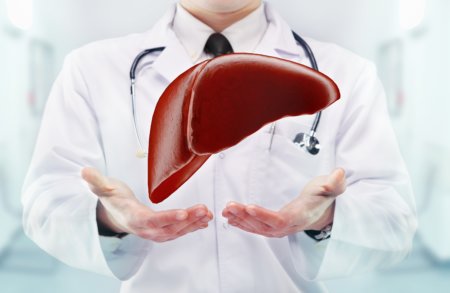
In mice with liver damage, saffron decreased levels of highly toxic proteins and fat deposits in the liver [R].
In rats, saffron extract protected against drug-induced liver damage [R].
This effect is mediated by 3 possible ways [R]:
- Inhibiting certain enzymes that create toxic byproducts
- Protecting against oxidative stress
- Regulating the cell structure of the liver (hepatic membrane)
21) Saffron May Prevent Seizures
Saffron has been used in traditional medicine for its ability to prevent seizures (anticonvulsant properties) for a long time. When tested in both rats and mice, saffron use was able to suppress seizures at doses above 400 mg/kg [R].
However, a very high dose of saffron was required to see these benefits. Such high doses pose the risk of toxicity and adverse effects [R].
In epileptic mice, saffron’s active ingredient safranal was able to suppress seizures. This is due to binding at the GABA A receptor, similar to the way benzodiazepine drugs (Xanax, Valium) are successful in preventing certain types of seizures (absence seizures) [R].
22) Saffron May Benefit Diabetes
In muscle cells, saffron increased glucose utilization and the uptake of glucose from the bloodstream. When given alongside insulin, saffron enhanced the activities of insulin and the responsiveness of the cell to insulin [R].
In a rat model of diabetes, saffron supplementation was able to increase glucose uptake into cells when taken during exercise [R].
23) Saffron May Improve Eyesight

Saffron extract supplementation was able to improve blood flow to the eyes and therefore, improve vision in animals with age-related visual decline. This effect is mediated by crocin, which dilates the vessels carrying blood to the eyes [R].
Dosage
Saffron supplements should be taken twice daily, in doses ranging from 30 mg to 50 mg per serving [R].
The maximum daily dose of saffron is 1500 mg. This value may be lower in pregnant women or patients with genetic variations that may enhance the effects of saffron [R].
Doses above 5000 mg are toxic and potentially fatal. Pregnant women are at risk of having spontaneous miscarriages at doses above 5000 mg [R, R].
Side Effects of Saffron Supplementation
Saffron is considered a safe supplement to add to your daily regimen. Although side effects are rarely seen with saffron supplementation, some minor discomfort may occur, including [R]:
- Dry mouth
- Anxiety
- Dizziness/drowsiness
- Nausea
- Change in appetite
- A headache
Some people may exhibit allergic reactions to the carotenoids found in saffron. These reactions usually take form as hives, nasal congestion, or difficulty breathing [R].
Pregnant women should not take saffron (unless they consult a doctor), regardless of the potential benefits that have been demonstrated in earlier studies. Enough evidence indicates that saffron may pose a risk to the fetus and the mother [R].
Taking high doses of saffron for a long period of time may lower your red blood cell count [R].
Limitations and Caveats
Although extensive research has been conducted on saffron, a few caveats exist that limit the reliability of these studies:
- Different studies use various parts of the Crocus sativus plant; petals, extracts, isolated crocin or safranal, supplements, or gels. The chemical composition of the different parts of the plant vary and thus, the full profile of health benefits may be limited to one part of the plant.
- Most of the clinical studies on the health benefits of saffron were undertaken in Iran. Patients with different genetic backgrounds may respond differently to saffron. Therefore, global wide-scale studies are required to accurately determine if saffron has significant benefits for people of different backgrounds.
- Many of the doses used are much higher than the dose of saffron obtained from foods.
- Cooking with saffron may break down the active chemicals, rendering them ineffective for treating certain conditions. Therefore, to see the full benefits of saffron it is recommended that this substance is taken in supplemental form.
- Saffron manufactured by different companies may have different chemical compositions and therefore, the benefits cannot always be guaranteed unless purchased from a reliable source (see below for where we recommend buying saffron).
Adulteration of Saffron
Due to the high price of saffron, vendors often sell adulterated versions of this spice. This adulteration can range from substituting a completely different plant such as safflower or marigold flowers, to adding dyes to recover the color of already used saffron. It is not uncommon to see other parts of the Crocus sativus plant used in place of the stigmas (the part that constitutes saffron) (R).
Therefore, saffron supplements, teas, and the spice itself should only be purchased from known, reliable sources. We recommend https://www.iherb.com/c/saffron for purchasing pure saffron supplements.
Drug Interactions
There are no known drug interactions with saffron supplements.
However, this does not mean that supplementing with saffron while taking medications is safe.
Saffron is presumed to have activity at the serotonin reuptake pump, acting as an inhibitor of this protein (SSRI). If you are taking an antidepressant that increases serotonin levels, consult your doctor before supplementing with saffron. You may be at risk of developing serotonin syndrome, which is a life-threatening condition.
User Experiences
A number of users purchase saffron for its ability to improve mood and regulate appetite. There are mixed reviews regarding saffron supplementation.
“Taking to control cravings. Found it does suppress appetite and boosts mood. Not a miracle drug though.”
“I found after a few weeks it definitely helped me control my appetite. I did not look at side effects until after this time and found out the odd dizziness and nausea I was feeling was definitely a side effect. The dizziness was actually frightening because it was severe.”
“I had a horrible migraine-like headache and dizziness after about 4 weeks of use. I was nauseous and overall malice feeling.”

